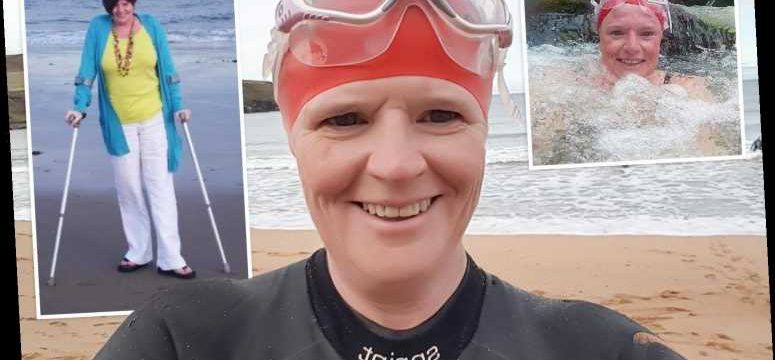DAWN Craig, 48, is a charity worker and lives near Peebles, MidLothian.
“Stepping into the cold water, my heart was racing. The sea was grey and choppy, and even though I was wearing a wetsuit I had goosebumps.
Slowly, I began to swim, and as I focused on my body my nerves faded away. Sitting on the beach afterwards, I was on a high. It had been my first wild swim – and I was hooked.
For many people, weekend mornings mean a lie-in, then breakfast in their pyjamas. But not me.
Instead you’ll find me in seas, lochs and reservoirs in all conditions – I’ve even had to smash through ice with an axe to get into the water.
Wild swimming is more than a hobby: it has transformed my life. Seven years ago, I was so disabled by chronic pain I couldn’t get out of bed. Unable to bear my life any longer, I attempted suicide.
Every time I step into the water, I’m thankful I didn’t succeed.
I initially damaged my spine in 1994 when I slipped at a swimming pool on holiday in Turkey. Pregnant with my daughter Jodie, now 25, I was in pain but able to walk.
I had to wait until she was a year old before I could have surgery to give my body time to recover from pregnancy and childbirth.
The op went well and for seven years I led a normal life, working as a homeless prevention officer and raising Jodie as a single mum after my relationship with her dad ended when she was 18 months old.
Then one day in 2002, I began getting excruciating pain in my lower back and legs. Despite X-rays and scans, doctors didn’t know what was causing it, and I was prescribed strong painkillers.
The pain worsened and I became less mobile and reliant on medication, even though it didn’t fully stop the pain. Family and friends helped care for Jodie, and I had to be medically retired at 35.
Sometimes I was bed-bound or could only get around the house on my hands and knees. Or I had to use a wheelchair, which I hated, so I became reclusive.
I was severely depressed. I had no independence, was in constant pain and unable to be a proper mum.
So in 2012, while Jodie was on holiday with family, I took an overdose and went to sleep not expecting to wake up.
I did it in a moment of despair and frustration, so I didn’t leave a letter. Somehow, I woke up the next morning.
A few days later I told my family and they were devastated. I felt guilty because they’d helped me so much.
That darkest moment became a trigger for change. I confided in my GP and was assigned carers, equipment to help me get around and a physiotherapist, who recommended gentle swimming.
I was still in pain, but my mobility improved until I could get around with a walking stick. In 2015, I returned to work as a health and wellbeing practitioner for the charity Thistle Foundation.
It was my physio who suggested I try wild swimming. I was intrigued but thought it sounded crazy, especially in the Scottish climate.
BTW
- Wild swimming is swimming in any natural body of water.
- In Scotland, all waters are accessible, but there are restrictions in some areas in England and Wales.
However, after years of feeling I couldn’t do things, I decided to be brave and give it a try.
In December 2016 I got in touch with a local wild swimming group and arrived at Portobello Beach near Edinburgh.
I was apprehensive – it was so different from the leisure centre pool I was used to – but within moments of being in the water, I got it. It was cold, but so exhilarating.
I’ve since swum all over Scotland, including Loch Lomond, and in the Lake District, forging friendships with other swimmers.
If I was in pain, getting into the water – even just to paddle in the shallows – helped hugely. As my body has got stronger, I’ve regained my independence and it’s helped me heal mentally.
Swimming gives me time to think and reflect on what I went through and how far I’ve come.
In summer, I swim almost daily, and in winter I go out at least once in the week and both days at the weekend.
I found getting into a wetsuit too difficult, so now I just wear a swimsuit and feeling the water on my skin is amazing.
I’ve swum with hail pelting down, in blistering sun and in sub-zero temperatures. I’m hoping to take part in a relay across the Channel next year.
I’ve never had a formal diagnosis of what caused my chronic pain, but one doctor thought I had Ehlers-Danlos syndrome – a rare condition that affects connective tissue.
I’ve decided against getting tested for this as I want to focus on living now, rather than what was wrong with me all those years.
I haven’t had pain for a year now, no longer need a cane to walk and recently, I came off the last of my medication gradually with support from my GP.
Jodie is proud of me and how I’ve changed my life, and although I live alone now she knows I’m fine. I don’t recognise that broken, sad woman I was seven years ago. I have wild swimming to thank for that.”
- Dawn features in Taking The Plunge by Anna Deacon and Vicky Allan, out now (£20, Black & White Publishing).
 6
6Source: Read Full Article





